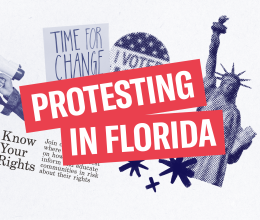
As we suspected, local law enforcement officials are borrowing cell phone tracking devices known as “stingrays” from the U.S. Marshals Service—and police are deliberately concealing the use of stingrays in court documents submitted to judges in criminal investigations.
The ACLU of Florida released a set of internal police emails obtained today through a public records request with the subject line “Trap and Trace Confidentiality.” The documents confirm that local police, working on state court matters, hide behind the sham cloak of the U.S. Marshals’ office to keep the information about stingray use out of court files—and beyond even a court’s custody and reach.
In the email exchange, a Sarasota Police Department sergeant wrote that in a warrant application to a judge, a North Port Police Department detective had “specifically outlined the investigative means used to locate the suspect,” and the sergeant asked that the detective “submit a new PCA [probable cause affidavit] and seal the old one.” In other words, fix the old affidavit and keep the use of the stingray equipment secret.
The sergeant also wrote, “In the past, and at the request of the U.S. Marshalls [sic], the investigative means utilized to locate the suspect have not been revealed so that we may continue to utilize this technology without the knowledge of the criminal element. In reports or depositions we simply refer to the assistance as ‘received information from a confidential source regarding the location of the suspect.’ To date this has not been challenged…”
In a later email, a North Port PD official wrote, “We have implemented within our detective bureau to not use this investigative tool on our documents in the future.”
Concealing the use of stingrays deprives defendants of their right to challenge unconstitutional surveillance and keeps the public in the dark about invasive monitoring by local police. And local and federal law enforcement should certainly not be colluding to hide basic and accurate information about their practices from the public and the courts.
This post also appeared on ACLU National's Blog of Rights.





